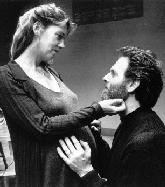SEARCH CurtainUp
REVIEWS
FEATURES
NEWS (Etcetera)
ADDRESS BOOKS
Broadway
Off-Broadway
BOOKS and CDs
OTHER PLACES
Berkshires
London
Los Angeles
Philadelphia
Elsewhere
QUOTES
On TKTS
LETTERS TO EDITOR
FILM
LINKS
MISCELLANEOUS
Free Updates
Masthead
NYC Weather
An Immaculate Misconception,
|
Science is inherently dramatic. . . because it deals with the new and unexpected. But does it follow that scientists are dramatic personae or that science can become the stuff of drama?
--- Carl Djerassi, This Man's Pill, Chapter 11. "Science On Stage" |

Ann Dowd & Thomas Schall
(Photo: Marvin Einhorn) |
Dr. Djerassi knows how to talk about science without sounding off-puttingly scientific. According to his just published memoir (see link below) An Immaculate Misconception was his "crash course in playwriting." The lessons he learned resulted in twenty-four revisions and the production now at Primary Stages prove him to be a quick study. A reading of an earlier version posted online indicates that the author astutely scuttled some extraneous scenes, fitting pertinent bits of dialogue into other scenes. The result is a ninety-minute drama which is braced by crisp, natural and often funny dialogue and action that progresses with nonstop momentum.
By creating a fictitious inventor of the very real ICSI technique, Dr. Djeassi, has interwoven science fact with timeless romantic fiction. The parallel of Dr. Melanie Laidlaw's (Ann Dowd) experiments irn the laboratory and her love affair with Menachem Dvir (Thomas Schall), an Israeli nuclear engineer she's met at a science congress brings the world of biomedical science alive with excitement which is best illustrated during the scene in Melanie's laboratory and her partner, the slyly named Dr. Felix Frankenthaler (David Atkins) join an egg and sperm. Watching Melanie manipulate that sperm and egg on an overhead screen and listening to the two scientists' excited back and forth banter has every bit as much sizzle as the sexy first night encounter with Menachem that opens the play. That laboratory scene and the first sexual encounter also serve to establish the two sides of Melanie: the scientist who dreams of fame and the woman who yearns for motherhood.
Having taken the liberty to marry invented characters to real science, the playwright has made Melanie the beneficiary of her own technique since the egg she uses is her own and the sperm Menachem's. A prologue featuring a monologue by Adam (Adam Rose) on the eve of his Bar Mitzvah makes the success of the fertilization procedure a foregone conclusion. Instead, the suspense of this science-in-theater drama (as opposed to science fiction to which this type of experiment was relegated before what might be possible became real) is in how and why Melanie manages to get Menachem's sperm into her laboratory, why she does so secretly and how all this plays with her lover and colleague, and how Adam feels about being an ISCI baby. If I outlined these hows and whys here, it would all sound overly manufactured, a danger with most faction. Fortunately, the likeable and very human characters, well portrayed by the four-member cast, offset any credibility gaps. In short, it works.
Director Margaret Booker and her design team have given the play a stylish staging. A screen about the size of a very large TV set serves as a computer screen for the epistolary interludes via att.world.net as well as the filmed ISCI procedures in the fifth and sixth scenes. The fact that these films are based on actual fertilizations conducted by two California scientists adds to the authenticity -- the correlation of the running dialogue is terrifically effective.
Dr. Djerassi is something of a Renaissance man or as he himself has put it "an intellectual polygamist." Besides his fame as "the father of the Pill" he has enjoyed careers as a chemistry professor and a novelist (An Immaculate Misconception is based on his novel Menachen's Seed). Having passed three score and ten, he embarked on his latest journey as a playwright. Oxygen, the second of a trilogy of plays about cutting edge medical issues, revolves around a new, retroactive Nobel Prize and explores the questions what discovering science means and why it is so important for scientists to be first. Like Misonception it promises another intriguing and thought-provoking evening in the fascinating genre of science-in-theater.
Dr. Djerassi's recently published new book, This Man's Pill: Reflections on the 50th Birthday of the Pill is available at CurtainUp's Book Store
LINKS
Other science based plays reviewed by CurtainUp
Copenhagen
The Lone Runner as he himself has put it "an intellectual polygamist."
Tesla''s Letters
QED (in LA and soon at Lincoln Center)
|
An Immaculate Misconception,
Written by Carl Djerassi Directed by Margaret Booker, Cast (alphabetical Order): David Adkins, Ann Dowd, Adam Rose and Thomas Schall. Set Design: G.W. Mercier Costume Design: Laura Crow Lighting Design: Deborah Constantine Music andSound Design: Lewis Flinn Running Time: 90 minutes without intermission Primary Stages, 354 W. 45th St. (9th/8th)212/ 333-4052 Mon, Wed-Sat 8pm; with matinees Sat 2:30and Sun 3pm. 10/01/01-10/21/01; opening 10/10/01 Reviewed by Elyse Sommer based on October 5th performance |




